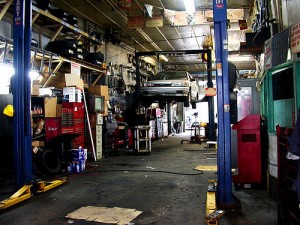
Things are getting awfully complicated, aren’t they? The custom parallel CPUs, proprietary communications networks, and encrypted data ports require extensive training, special tools, and a computerized reference library to comprehend, much less debug. And the manufacturers, who derive much of their money and differentiation from warranties and authorized repair centers, are loathe to see independent shops get a piece of the action.
Yes, today’s automobile market sure is complex. Did you think I was talking about computer systems? The current state of the retail auto industry has a lot to teach us in the computers and communication devices! There are many parallels between cars and computers, after all.
Selling an Ecosystem

Early automobiles were a lot like early computers: Many were hand-made and none was all that useful. Sure, Bertha Benz managed to drive to Pforzheim in 1888 to visit her mother, but she had to repair her husband’s motorwagen multiple times during the 60 mile trip. While automobile technology has certainly improved since then, the real innovation that drove the world to drive cars was the ecosystem that surrounds them.
Carl Fisher may not be familiar to most, but he deserves as much credit as Henry Ford, Billy Durant, Ferdinand Porsche, Eiji Toyoda, and so many other engineers and industrialists. Fisher realized that, in addition to being technically sound and affordable, the automobile must be embraced by the public to succeed. He switched from supplying headlights to convincing the public that car ownership was a desirable thing, creating a multi-brand dealership, founding the Indianapolis 500, and redirecting the Good Roads Movement to support highways suitable for long-distance automobile trips.
Fisher’s insight was similar to that of Steve Jobs’ at the first incarnation of Apple: People want a place in an ecosystem not just a piece of technology. Fisher’s Lincoln and Dixie Highway projects gave the public a reason to buy a car. Similarly, Jobs’ Apple II and Macintosh projects focused as much on what people would do with the computers as what they were made of. Much of Apple’s current success is due to the way customers experience the company, from the upscale yet inviting Apple Stores to the curated iOS App Store.
Apple’s “walled garden” approach to computers and mobile devices may draw derision from techies but the public loves it. They don’t want a Macintosh, iPhone, or iPad; they want a thing that lets them do what they do. The ability to easily install and use applications and accessories easily outweighs the arbitrary and capricious limitations placed on them by Apple and AT&T. Regular people don’t want multiple windows on screen with multitasking applications; they want instantly to turn on their “pad”, perform a task, and set it aside. The Apple ecosystem empowers this.
Total Customer Experience
Lexus set the benchmark for modern automobile ownership after their 1989 debut in the United States. The company created a total customer experience, from inquiry to sales to ownership and support, recognizing that upscale buyers would pay a premium to be coddled by their car company, not just their car. In fact, if Apple is copying anyone with their glass Stores and Geniuses and AppleCare it is Lexus.
Every premium automobile marque labors to offer a Lexus-like customer experience today. Basic mechanical warranties became bumper-to-bumper service, and dealer service bays transformed into destinations with free car washes and cappuccino bars. Like Apple, today’s carmakers want to coddle their customers and shield them from the cruel world of discount stores and independent repairmen.
Right to Repair and DMCA Exemptions

But Apple and the automakers might have stepped a bit too far, turning from walled garden to gilded cage. Worried that openness would corrupt both their pristine equipment and customer experience, manufacturers began to lock out unauthorized parts and modifications. But in so doing they also imposed restrictions that threaten to turn owners into mere users at the whim of the companies.
My Mazda MX-5 Miata is far from a walled-garden “experience” luxury car. I love it, in fact, because it’s a wonderfully basic, visceral, and mechanical car. But the Bose audio system that came with it is as complex and locked-down as anything in a Lexus. Adding a basic auxiliary input required decoding a proprietary bus and creating a custom chip to emulate the tape deck module, an admirable piece of work indeed!
With even a simple car’s audio system gaining this kind of complexity, it’s no wonder that independent repair shops are feeling squeezed out. This is why the Massachusetts “Right to Repair” law is getting such widespread attention. Independent repair shops (and yes, aftermarket equipment makers) are attempting to force automakers to allow them access to the proprietary technology in their cars. Yet even if they break open the gilded cage, the walls of “total customer experience” may prove harder to crack.
The exemptions to the DMCA handed down by the copyright office this week are remarkably similar. Although the Office did not go as far as many would have liked, they firmly stated that companies shouldn’t use copyright law to restrict the use, preservation, and repair of certain products. Of particular interest to both DMCA opponents and Right to Repair fans is the long-term implication of walled-off technology. What happens when a “dongle” or key is no longer manufactured or supported? Will anyone be able to repair a Mercedes-Benz, Audi, Lexus, or Apple in 20 years?
Stephen’s Stance

Unquestionably, the world is worse off if manufacturers completely restrict basic access to their products. The short-term impact on buyers, though concerning, are trumped by the long-term implications. The copyright office is wise to realize that DRM, encryption, hardware lock-in, and “dongles” threaten to effectively delete audio, video, print, and entertainment properties once their manufacturer decides they are obsolete. And Right to Repair is urgently needed to keep historically-important automobiles from becoming useless hunks once their manufacturers stop supporting them.
But the rosy picture painted by the EFF, iPhone jailbreakers, independent mechanics, and other freedom-loving folks aren’t entirely justified. As Carl Fisher and Steve Jobs proved, consumers want an ecosystem, and enjoy luxuriating in a gilded cage. The success of the iTunes store demonstrates that buyers value convenience over freedom when it comes to entertainment, making Apple’s move to remove DRM from their audio content gratifying indeed. And Apple and Lexus buyers remain loyal to the companies despite widely-publicized product defects. Perhaps Right to Repair and the DMCA exemptions are about protecting consumers from themselves rather than from predatory manufacturers.
Image credits: “Lemur Cage 2” by Stephen Foskett, “Lincoln Highway Bridge, Tama, IA” by cwwycoff1, “Mechanic Shop” by Tomas, “The View Through The Furry Handcuffs” by Annie in Beziers
Leave a Reply